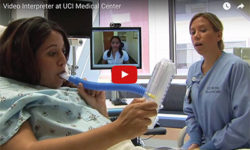In-Hospital Medical Interpretation
Simultaneous interpreting is a skill that some liken to singing a song you're hearing for the first time, without knowing the words. Not an easy feat, even for those with perfect language pitch. Some hospitals require interpreters to ware the white lab coats that designate them as part of the hospital's medical teams.
All medical interpreters must receive intensive training in medical terminology, and some hold degrees in science or formal interpreting translation schools.
According to Stanford University their interpreters have been influential in shaping best practices and professional standards for the medical interpretation field.
A new state law makes knowledge of CHIA standards mandatory for hospital interpreters.
Because interpreters experience their patients' pain on some level, interpreters say the job can be emotionally challenging at times. Interpreters keep up with new terms and technologies by reading online journals and other research materials.
Then there are the intimate exchanges that can happen at the very end of an appointment. Patient and interpreter will be leaving a physician's office, and the patient will turn to her new friend, who speaks her language and who now knows the most intimate details of her condition or diagnosis. "Suddenly, the patient may ask, 'What do you think I should do?'"
This is why the code of ethics required with the position must be strictly implemented. The patient’s connection must happen with the provider not the interpreter.




